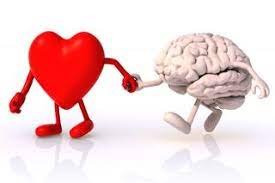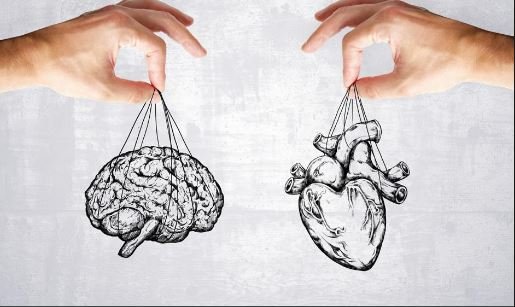HEALTHY HEART, HEALTHY BRAIN

I remember eating my first omelet like it was yesterday.
(What, you don’t?) We were in the kitchen of our New York
City apartment when my mom whisked up an egg to make
an omelet for me. I was seven or eight. My mom was always
afraid of heart disease, having had a father who passed from
it, which probably explained why growing up I never saw
her eating eggs. Their cholesterol-rich yolks, after all, had
been in the national doghouse for decades as a causative
player in heart disease. One night, however, she offered to
cook one for me as a treat.
She calibrated the flame on her beloved cast-iron skillet,
given to her by her own mother, which had been seasoned
with the corn oil that always sat by the stove.* I sat down at
the breakfast bar so that I could watch her and, a couple of
moments later, picked up a knife and fork. As she slid the
plate over to me, my excitement for what was to be my first ever egg-eating experience was deflated by a sudden
warning from Mom: “You can’t eat these too often. The fat
and cholesterol in the yolks will clog your little arteries!”
(To her credit she also often told me that trying new foods
would make me a better lover to the future Mrs. Lugavere. I
was always a picky eater, and this was her way of getting
me to loosen up. My mom always had a quirky sense ofhumor. Did her promise hold true? Let’s just say I remain a
picky eater.)
A few years later, we were on vacation in south Florida,
which is where many New Yorkers retreat to in order to
escape the winter cold. It was there that I had my first taste
of another food: coconut. I instantly fell in love with the rich
texture, subtle sweetness, and tropical flavor. At the ripe old
age of twelve, I understood in that moment why New
Yorkers liked Florida so much—the coconuts! But that affair
too was cut tragically short when my mom told me that
coconut meat was unhealthy. “It’s rich in saturated fat,
which is bad for the heart.”
In this chapter, we’re going to take a swan dive into all
things vascular health. Why a whole chapter dedicated to
blood vessels in a book about the brain? Because the health
of your veins and arteries affects more than just the heart
and your potential for heart disease. The brain is fed
nutrients, energy, and oxygen by a power grid of an
estimated four hundred miles of microvasculature. Any
outage along this network (leading to reduced blood flow to
the brain) not only contributes to cognitive impairment,
increasing risk for both Alzheimer’s disease and vascular
dementia, but can also produce the subtler deficits in
cognitive function that we typically associate with aging.1
And, really, who wants that?
The Diet-Heart Debacle
Today we’re armed with a much deeper understanding ofvascular health than we’d been in the past, but
unfortunately, many doctors still dole out outdated advice.
We don’t know everything, but it has become increasingly
clear that if there is a dietary super-villain out there, it is not
saturated fat. In 2010, Dr. Ronald Krauss, a top nutrition
expert in the United States who was involved in coauthoring
many of the early dietary guidelines, concluded in a meta analysis that “there is no significant evidence for concluding
that dietary saturated fat is associated with an increased risk
of CHD [coronary heart disease] or CVD [cardiovascular
disease].”2
Still, the “diet-heart hypothesis”—or the idea that
cholesterol in and of itself causes heart disease—persists.
This hypothesis originates from initial studies on
atherosclerosis, a disease in which plaque builds up to create
a hardening and narrowing of the arteries. In these studies,
plaques from dissected cadavers were found to be filled with
cholesterol. In fact, this is the basis for the catchy, oft-cited
idea that “eating fatty foods clogs your arteries,” which
likens our complex biology to what happens when you pour
grease down a cold drain. Because saturated fat does raise
cholesterol, and cholesterol-rich foods, you know, have
cholesterol in them, reducing intake of both became the
focus of efforts for the prevention and treatment of
cardiovascular diseases. But biology is seldom simple. As it
turns out, cholesterol is often the innocent bystander—
present at the scene of the crime, but rarely the villain itself.
Many nutrition scientists, including Ancel Keys, the
father of the diet-heart hypothesis, try to reduce whole foods
to their constituent “nutrients”—and who could blame
them? The discovery of vitamin C cured scurvy. Vitamin D
prevents rickets. These were big wins with simple solutions.
So when scientists turned their focus to heart disease, it was
seductive to buy into the simplistic reductionism:
Cholesterol is found in the arteries of heart attack victims.
Eating more saturated fat increases blood cholesterol levels.
Therefore saturated fat causes heart disease by increasing
blood cholesterol levels. Just complex enough to be
plausible to doctors, and just simple enough to neatly
package the story for the public.
But as computer programmers like to say, “Garbage in,
garbage out.” The enormous complexity and interplay
between food and biology often defies our ability to model
it, let alone tinker with it by introducing purified or synthetic
foodstuffs. Statistician Nassim Taleb, who focuses on
randomness, probability, and uncertainty, and who
predicted the Much of the local research in experimental biology, in
spite of its seemingly “scientific” and evidentiary
attributes, fails a simple test of mathematical rigor. This
means we need to be careful of what conclusions we
can and cannot make about what we see, no matter
how locally robust it seems. It is impossible, because of
the curse of dimensionality, to produce information
about a complex system from the reduction of
conventional experimental methods in science.
Impossible.
In other words, given the incredible complexity of our bodies and our relatively limited scientific tools, we should
be intensely skeptical of any rapid, engineered change to
our food supply. When the US government stepped in and
skimmed the fat off the American diet, our leaders fell into
precisely this trap: prematurely applying flawed scientific
observations to policy.
Cholesterol and the Brain
It’s time for a reality check. Cholesterol is a vital nutrient for
the body, and particularly for the brain, where 25 percent of
the body’s total cholesterol content can be found. It’s a
critical component of every cell membrane, where it
provides structural support, ensures fluidity of nutrient
transport into and out of the cell, and may even serve as a
protective antioxidant. It’s essential for the growth of
myelin, the insulating sheath that surrounds your neurons.
(Myelin becomes a casualty in multiple sclerosis, an
autoimmune condition.) It’s also important for maintaining
brain plasticity and conducting nerve impulses, especially at
the level of the synapse; depletion of cholesterol at this level
leads to synaptic and dendritic spine degeneration.5
Dendritic spines, the branch-like touch-points that facilitate
neuron-to-neuron communication, are thought to be the
physical embodiment of memories.
Dr. Yeon-Kyun Shin, an authority on cholesterol and its
function in the brain, recently published findings in the
journal Proceedings of the National Academy of Science salerting us to the unintended downstream consequences of
using blanket cholesterol-reducing medicines (in this case,
the ubiquitous class of drugs called statins). In the
accompanying press release, he elaborated: “If you deprive
cholesterol from the brain, then you directly affect the
machinery that triggers the release of neurotransmitters.
Neurotransmitters affect the data-processing and memory
functions. In other words—how smart you are and how well
you remember things.”
Large-population studies have validated Dr. Shin’s fears.
In the lauded Framingham Heart Study, an ongoing
multigenerational analysis of heart disease risk in residents
of the Massachusetts town, two thousand male and female
participants were subjected to rigorous cognitive testing.
Researchers found that higher levels of total cholesterol,
even above the so-called healthy range, were associated
with better scores on cognitive tests involving abstract
reasoning, attention and concentration, verbal skills, and
executive abilities.6 Subjects with lower cholesterol
displayed poorer cognitive performance. Another study of
185 elderly people without dementia found that higher
levels of both total cholesterol (combining both HDL and
LDL) as well as LDL alone (often considered the “bad”
cholesterol) were both correlated with better memory
performance.7 There is even some data suggesting that
higher cholesterol may be protective against dementia.
A recent study of twenty thousand people found strong
evidence that those using cholesterol-lowering medications
called statins had increased risk of Parkinson’s disease, the second most common neurodegenerative disease, which
affects movement. “We know that overall weight of the
literature favors that higher cholesterol is associated with
beneficial outcomes in Parkinson’s disease, so it’s possible
that statins take away that protection by treating the high
cholesterol,” senior study author and vice chair for research
at Penn State College of Medicine Xuemei Huang said in an
interview with the website Medscape.
CLEAN YOUR AIRWYS NATURALLY WITH SALT STONE

